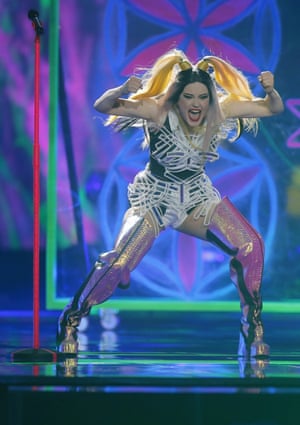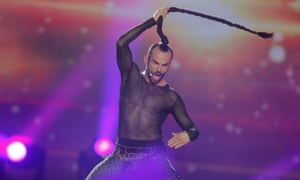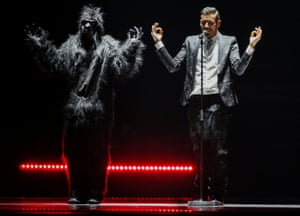On Saturday night, Lucie Jones will look deep into more than 200 million European TV viewers’ eyes and sing the healing words our troubled continent needs to hear: “I will never give up on you / I don’t care what I’ve got to lose / Just give me your hand and hold on / Together we’ll dance through this storm.”
Fabulous stuff, though judging by her performance at the semi-final, the choreographers of the UK’s 2017 Eurovision entry have missed a trick. What they should have done is surround Lucie with a circle of dancers like that Matisse painting, each in their different European national costumes and all blown around the Kiev stage by wind machines until everybody was symbolically naked.
With Europeans loathing each other as never before this millennium – the Greeks hating Germans for administering a financial punishment beating on their country, Ukrainians hating Russians for annexing bits of theirs, and 27 blank-eyed continentals in the proverbial after-hours pub car park gathered to give Britain’s prone body a kicking – never has Lucie’s call for love and unity been more necessary.

Naturally, the bookies don’t give her a chance: she’s 25-1 to win and 14-1 to get nul points. Lucie’s outsider status is not entirely because Never Give Up on You is a vapid plodder of a ballad that seems composed by algorithm not human hand, but also because in 2017, the UK’s Eurovision role is not to inspire Europeans to love each other, but rather to take over the baton of shame from Russia.
Historically, Russia existed in Eurovision to be booed – for human rights abuses, for seizing Crimea and for having a president who takes off his top for photoshoots. In 2009, Georgia’s entry We Don’t Wanna Put In was barred because it was deemed anti-Putin (gee, you think?). Last year, Ukraine’s Jamala won Eurovision with her even more politically explosive number, 1944, about Stalin’s mass deportation of around 240,000 Crimean Tatars and a song that took on new relevance for Ukrainians given recent Russian incursions. “When strangers are coming,” sang Jamala, herself a Crimean Tatar, “they come to your house, they kill you all and say: ‘We’re not guilty … not guilty’.”
Sadly this year, the Russians won’t be there to be booed, so the UK must take over that sacrificial role. Ukraine has banned Russia’s entrant Julia Samoylova from travelling to Kiev for the contest because, unacceptably to Ukrainians, she had performed in Crimea after annexation. Ukraine’s decision was condemned not just by Russia but by Eurovision’s Frank Dieter Freiling for undermining “the integrity and non-political nature of the Eurovision song contest and its mission to bring all nations together in friendly competition”.
In truth, though, Eurovision has never been as Freiling sees it. War, argued Von Clausewitz, is the continuation of politics by other means. Eurovision, he should have added, is the continuation of war by means of unspeakable music. Consider Cliff Richard. In 1968, his British Eurovision entry, Congratulations, lost by one vote to Spain’s even more awful entry, La, La, La by Massiel. How? In his documentary 1968: I Lived Through the Spanish May, film-maker Montse Fernández Villa claimed that votes were bought to secure a Spanish win by TV directors touring Europe at the behest of fascist dictator General Franco.

Worse was to come. In 2006, geneticist Derek Gatherer published Comparison of Eurovision Song Contest Simulation with Actual Results Reveals Shifting Patterns of Collusive Voting Alliances, arguing that bloc voting, or what he called “a horizontally spreading cultural behaviour that has progressively colonised the contest”, was akin to what Richard Dawkins called a meme in The Selfish Gene.
Non-political? Friendly competition? Not really. Gatherer disclosed there was a Viking Empire (Norway, Sweden, Estonia, Denmark, Iceland, Finland, Latvia and Lithuania), a Balkan Bloc (Croatia, Macedonia, Slovenia, Greece, Cyprus, Serbia and Montenegro, Turkey, Bosnia Herzegovina, Albania and Romania) and the soon-to-collapse Warsaw Pact (Poland, Russia and the Ukraine), the “Partial Benelux” (Belgium and the Netherlands) and the Pyrenean Axis of Spain and Andorra. By contrast, France, Germany and the UK were disastrously non-aligned so couldn’t win. In 2008, the late Terry Wogan quit as BBC Eurovision presenter, sickened at how bloc voting was undermining Eurovision’s supposed principles.
But despite Wogan’s stand and complicated rule changes aimed at scotching psephological skulduggery, the shame of bloc voting continues. And Lucie Jones’s message of unity is destined to go unheard as Eurovision entrants climb over each others’ faces to win in Kiev.
Could she win? Of course not. In part that’s because of the annoying irony that mere months after we voted for Brexit, the UK entry is called Never Give Up on You. The song is, if you think about it, Theresa May turned through 180 degrees: Lucie’s message to Europe is Brexit doesn’t mean Brexit. That won’t wash in Extremadura or Wrocław.
My guess is that Eurovision audiences in Kiev won’t buy this inversion. Instead, they’ll boo Britain for Brexiting and make the UK into this year’s Russia.
Never Give Up on You is a curious case of what Slovenian philosopher Slavoj Žižek calls fetishistic disavowal, which he defined thus: “I know it, but I refuse to fully assume the consequences of this knowledge, so that I can continue acting as if I don’t know it.”
By strange contrast, the Slovenian entry sounds like Brexiteer torch song rather than Jones’s unwitting Remoaner denial of the referendum result. “You’ve all been very kind,” sings Omar Naber, “ but I made up my mind / Now I’m about to leave you all behind / I’m feeling so alone, I’m turning down my tone / Before the rise of sun I will be gone.” Michael Gove wrote Omar’s lyrics, you know. Only kidding. It’s not quite as terrible as Romania’s unacceptable Yodel It, but Slovenia will not win.

So who of the 42 entrants should win? Italy. Why? Because Francesco Gabbani’s Occidentali Karma has a message even more topical than Jones’s. In the song, he quotes Hamlet, psychologist Erich Fromm, philosopher Heraclitus and Naked Ape author Desmond Morris.
Morris even praised the song in an interview with La Republica. This is perhaps the first time a Cambridge ethologist has backed a number to win Eurovision. But Morris is right: Francesco’s message about the perils of decadence and materialism demands to be heard by citizens of a continent that needs to heal itself pronto.
“Each person is a know-it-all thanks to the web,” sings Francesco. “Communities’ cocaine / The poor people’s opium … Internetologists / Honorary associates in the anonymous meetings of selfie-addicted / Intelligence is out-of-date / Easy answers. Worthless dilemmas.” To be fair, it sounds better in Italian.
At the end of the video for the song, Francesco, casting off a Buddhist monk’s robe, busts some moves with a dancing monkey in order – I suppose – to clinch the lyrics’ point about Western humanity evolving into a existential cul de sac.
It’s destined to be an iconic Eurovision moment – right up there with the time Bobby G and Mike Nolan whipped off the skirts of Jay Aston and Cheryl Baker during the denouement of Bucks Fizz’s Making Your Mind Up, thus helping Britain win Eurovision by four votes in 1981. Though perhaps a little more profound.
Eurovision 2017 is an after-hours pub car park – and the UK will get a kicking – The Guardian

